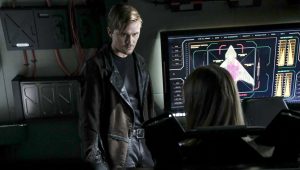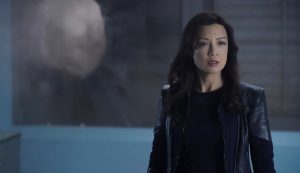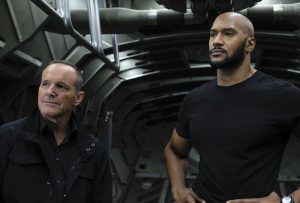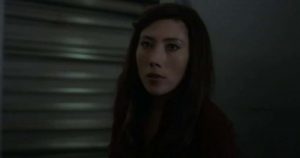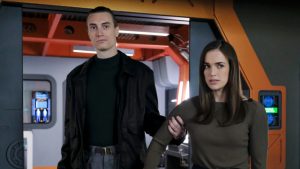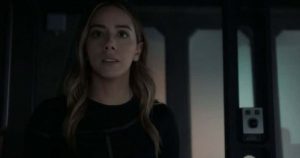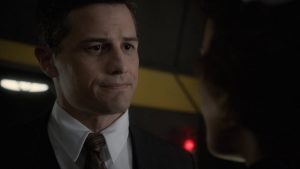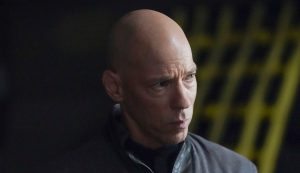MAJOR SPOILERS FOR AGENTS OF S.H.I.E.L.D. AHEAD!
After seven years, the end has finally come for Agents Of S.H.I.E.L.D., and I’m pleased to report it’s a glorious one. In so many ways, it’s the end of an era – for us, as the devoted fandom who stuck with the Agents Of S.H.I.E.L.D. team even when others claimed it wasn’t worth it because it would never be Marvel canon; for the cast and crew, obviously, since they’ve put so much hard work into making this show everything that it has become; and for an epic chapter of television history; Agents Of S.H.I.E.L.D. brought us seven seasons worth of brilliant, albeit absolutely bizarre, storylines spanning the entire Marvel Universe (and occasionally breaking out from its confines). And best of all…it’s a happy ending, the kind where all our major characters get to go out on a high note and nobody gets killed off just to make the plot more dramatic: in fact, precisely zero of our protagonists died on last night’s two-hour long finale event. On the flip-side, I think I can safely say that we, the audience, all died just a little as we had to grapple with the realization that this is…really it. It’s over. It’s done.
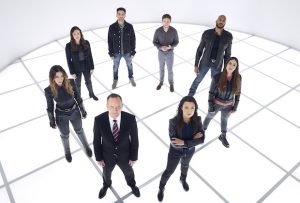
Though, if anyone is wondering – and be warned, you will be hearing about this a lot from me in the near future – there’s still plenty of ways in which Marvel could continue the story of certain S.H.I.E.L.D. team members, particularly Daisy Johnson (Chloe Bennet) and Yo-Yo Rodriguez (Natalia Cordova-Buckley), both of whom I still firmly believe can and should join the MCU proper.
The finale, which is actually two back-to-back episodes, gave us a lot to muse on: from Avengers: Endgame tie-ins and references, to cinematic visual effects, to the individual endings for each and every character’s arcs. Because this show has always centered around its amazing characters, we’re going to break down all of those endings one by one: yes, even the villains because villains deserve satisfying endings too.
Well, except for Chronicoms. And speaking of Chronicoms, let’s talk about them first and foremost because these folks (a race of emotionless cyborgs with the ability to steal human faces and wear them as their own) have been a mixed bag since they first showed up in any large capacity. When it was just Enoch (Joel Stoffer) back in season five, they did seem kind of interesting – but ironically, that was because Enoch turned out to be a rogue Chronicom who had actually developed emotions during his long sojourn on Earth. Particularly in this final season, the Chronicoms have felt very one-dimensional, with only their leader Sybil the Predictor (Tamara Taylor) having much personality. And that doesn’t really change much in the finale. The Chronicoms are extremely threatening, which helps, but they still don’t rank high on the list of Agents Of S.H.I.E.L.D. villains, with their vague motivations and bland character designs. In the opening minutes of the finale’s first half, they capture Daisy, Al “Mack” Mackenzie (Henry Simmons) and Daniel Sousa (Enver Gjokaj) as the trio of S.H.I.E.L.D. agents tries to launch a daring raid on the Zephyr One, where their friend Jemma Simmons (Elizabeth Henstridge) is being held prisoner. But apart from Sybil, the Chronicoms don’t actually come out in full force until the last half of the finale, when their entire army heads to the Lighthouse S.H.I.E.L.D. base in a last-ditch effort to stop their arch-nemesis Leopold Fitz (Iain De Caestecker), only to find themselves defeated by a very unlikely threat from above: Melinda May (Ming-Na Wen), who, after incapacitating Sybil with a kick to the face, uses her newfound empathetic powers to give the entire Chronicom army emotions. It’s a good idea in theory and it underscores the point that Agents Of S.H.I.E.L.D. has always been about compassion and unconditional love, but it’s definitely a concept that needed more set-up: and the way the Chronicoms simply drop their weapons, declare themselves to be friends, and then disappear completely from the story afterwards is…well, not exactly underwhelming because I didn’t expect much from the Chronicoms, but just a little anti-climactic.

But that’s okay, because they were never the real big bad anyway. This whole time, that’s been Nathaniel Malick (Thomas E. Sullivan), the son of HYDRA royalty, who was supposed to die young in 1970 but, due to timeline meddling, ended up surviving all the way into the present day, stealing some of Daisy Johnson’s seismic superpowers and becoming the finale’s main antagonist. I didn’t have a problem with this: Malick, despite his questionable fashion statements and anarchistic tendencies, is a lot more compelling than any Chronicom – and the duel between the two Quakes is every bit as epic as was promised. Malick’s goal by this point in the episode is to kill Daisy and use the remaining half of the Chronicom fleet that’s still descending through the earth’s atmosphere to wipe out S.H.I.E.L.D., and he figures that Daisy won’t be able to stop him because the only way she can feasibly kill him is by killing herself in the process. “That’s the idea”, Daisy responds – and she explodes. In the biggest display of her powers ever, she sends shockwaves tearing through space, ripping the entire Chronicom fleet to pieces: taking Sybil and Nathaniel Malick with it. But Daisy, at the eye of the hurricane so to speak, unintentionally survives the blast and her drifting body is picked up by Phil Coulson (Clark Gregg) in the Zephyr One just in time for her sister, Kora (Dianne Doan), to come in and revive her using her own healing powers.
Kora, the final season’s third major villain, has an awkward redemption arc at the last moment. She comes to her senses after a confrontation with Daisy, tries unsuccessfully to convince Malick that Daisy is actually a good person, gets shot for her efforts, and then uses her powers to assist Melinda May in the final battle. Fitz describes Kora as the key to ensuring the survival of the world and that’s great and all, but…what exactly did she do? Her powers get upgraded so quickly it’s hard to tell what her limits are anymore: first it was just glowing punches, then it was somehow related to electricity, then she could heal people, now all of a sudden she can shoot laser beams through space. But while I might have to rewatch the episode to clarify certain details, I’m still a little confused as to why her power was so vital. She saved Daisy, so I’m eternally grateful for that, but Daisy had already defeated the Chronicoms – her survival wasn’t necessary, except to fans. And the laser she shot at the Lighthouse achieved…what, exactly? In hindsight, I wish she had been introduced earlier in the season if only so we could have gotten a better idea of what she wanted and what she could do. But of course, that wouldn’t have worked because of the way the time jumps were going, so…
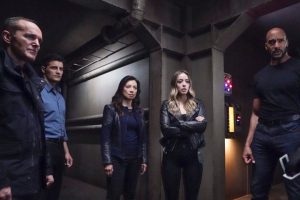
Speaking of time jumps. The emotional core of the entire finale is the FitzSimmons duo, who, as it turns out, have been orchestrating most of the events of seasons six and seven with masterful intricacy and a lot of help from time travel. As is explained in flashback, they both took off at the end of the season six finale and spent years perfecting a time machine design so they could eventually come back and save their friends. Fitz, whom we’ve been waiting for ages to show up again, finally reappears at the crucial midpoint of the finale and confirms that Agents Of S.H.I.E.L.D. is actually utilizing the same time travel logic from Avengers: Endgame – which states that going into the past creates divergent timelines, rather than changing the future. Amazingly, the Endgame tie-ins don’t end there. Not only does Fitz reference how time travel makes use of the subatomic Quantum Realm and explain that he’s been traveling the Realm all the time he’s been gone, examining different timelines to see which ones work in S.H.I.E.L.D.’s favor, but he actually takes the S.H.I.E.L.D. team through the Quantum Realm, along with the entire Chronicom fleet. This is all to make sure that the Agents get back to their original timeline and leave the other timelines mostly unscathed, but it has the added benefit of bringing the show closer to the MCU than it’s been in years.
Unfortunately, escaping the alternate timeline to return to the original one comes with consequences: one member of the S.H.I.E.L.D. team has to stay behind in the past to work the time machine apparatus, and that member is the rascally Deke Shaw (Jeff Ward), who offers himself up voluntarily. Deke has spent his entire time on the show trying to fit in, and he’s never truly belonged anywhere but the 1980’s. And, as he explains to the team, he’s kind of a rock and roll superstar in this alternate timeline. But that’s not his only task: with all of 80’s S.H.I.E.L.D. in chaos, Deke promises to step up to the challenge of becoming the organization’s new director, a title that definitely should not suit him as well as it does. Thankfully for him, he’ll get to work with a couple of agents who escaped the Chronicom attack on last week’s episode – including a younger but still instantly recognizable Victoria Hand (Saffron Burrows), who gets her long-overdue justice on her killer John Garrett (James Paxton) by shooting his younger version in the forehead.
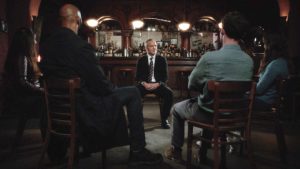
Returning to the day of the season six finale and what should be the proper timeline, the Agents of S.H.I.E.L.D. are able to overcome both Chronicoms and Malick. This requires a slight detour to the ancient Mesoamerican temple where the season six finale took place, where we reunite with Piper (Brianna Venskus) and the Inhuman Flint (Coy Stewart), both of whom have hilarious interactions with the time-traveling FitzSimmons as they try to make sense of what’s going on – one of the funniest moments is when Piper, for whom only a few minutes have passed, asks whether or not all the commotion is being caused by the death goddess Izel (the season six big bad), and Simmons has to wrack her brain just to try and remember who that is. But Piper and Flint aren’t just there for laughs, being asked by Simmons to stand guard over a mysterious chamber while she and Fitz manage the whole time travel business. As we discover near the end of the episode, that chamber contains something incredibly precious to FitzSimmons: their daughter, Alya, named after the star system in which they hid for years, lived their lives and designed their time machine. Alya, who speaks with a Scottish accent clearly inherited from her father, is the reason why the fight is so personal for FitzSimmons, and she’s the perfect culmination of their incredible love story.
And on that point…culminations. The end for so many characters we’ve grown to love over the past several years. FitzSimmons, luckily, are the first ones to get their happy ending, and they even get to enjoy it twice – since by finale’s end, they’ve settled down in the current timeline, on Earth. The last scene of the finale follows the entire S.H.I.E.L.D. team reuniting via hologram message at Enoch’s old hideout, the Swordfish bar, discussing old times, playfully teasing each other, and promising to stay in touch, with each eventually disconnecting and giving us a little glimpse into their new lives. FitzSimmons and little Alya are enjoying a picnic when we last see them, and they’ve never looked so happy. Their romance, which one seemed like a curse, has blossomed into something beautiful.
Mack and Yo Yo had the least to do in the finale overall, with Yo Yo only getting a couple of action scenes (standouts, nonetheless: that’s just how awesome she is), but their lives in the present day look fascinating. Mack is still director of S.H.I.E.L.D., and he’s sporting a very Nick Fury-like coat as he strides about the deck of his helicarrier. Yo Yo, meanwhile, is on assignment with her own team, which includes Piper and Davis (Maximilian Osinski), who has been resurrected as an LMD. Yo Yo has one last incredible moment as she jumps out of the team’s car and speeds off down the road, her upgraded Inhuman powers giving her the ability to go wherever she wants and never have to “bounce back” any longer.
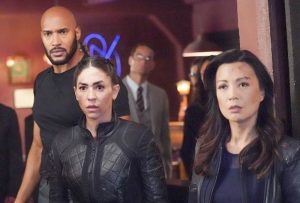
For Melinda May, her future involves a lot of hard work – but no longer as “The Cavalry” (a nickname she finally embraces near the end, putting aside the trauma she had formally attached to it). Instead, she now works as a teacher at the S.H.I.E.L.D. Academy, which has been renamed the Coulson Academy and also seems to sport a daisy in its new logo. Flint is amongst her students, and May seems genuinely happy helping the next generation begin their training as agents. Some fans of the Philinda romantic coupling are upset that she and Coulson didn’t head off into the sunset together, and I get that, but I also feel like May’s new empathetic powers lend themselves well to the role of a teacher (besides which, her and Coulson are still giving each other meaningful looks in the closing minutes so maybe there’s still a spark between them?)
Eventually the series brings us back down to where it all began, with Coulson and Daisy. Their relationship is the real core of the whole story: it’s fitting that they get the last word. For Daisy, her future includes a journey into the depths of space alongside Daniel Sousa (they end up together, which is…fine, I guess), and Kora, with the intention of reaching out to alien races across the galaxy – almost like they’re Agents of S.W.O.R.D. or something. Those of us who still want Daisy Johnson in the MCU will continue to push for an Agents Of S.W.O.R.D. series that includes her in some capacity, and the Agents Of S.H.I.E.L.D. finale has given us a tantalizing hint of how awesome it could be.

And as for LMD Coulson…who did NOT decide to power down or turn off completely, the future is looking bright. He’s taking some time to himself, traveling the world without any urgent plans, and he’s got a “cool” (the very last word spoken in the entire series) new flying Corvette modeled after his original car, Lola. A gift of Mack’s, the sci-fi vehicle allows Coulson to go out in an appropriately epic style, soaring over the streets of Washington D.C. and zipping away to destinations unknown. I was certain that Coulson would die this season, completing his cycle of death and rebirth, but this is a much more fitting end: after all, this whole series was started partly because of how much fans rallied behind the hashtag #CoulsonLives, after it seemed we had lost him forever in The Avengers. Coulson is, indeed, living his best life now.
And that’s the true beauty of this show. It’s always been about the fans. We’re not the biggest subsection of the Marvel fandom, but we’re passionate, we’re persistent, and we made it so much farther than anyone could have ever guessed. And in the end, I hope we’ll all keep in touch, just like the Agents Of S.H.I.E.L.D. – raise a toast to a spy’s goodbye for now, but somewhere down the line we might cross paths again. Maybe in the MCU, even, if we pressure Kevin Feige enough…
Once an Agent, always an Agent.
Episode Rating: 9.8/10
